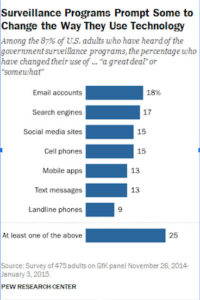Consumers everywhere want to know, Who’s sharing my information? Recent trends in government surveillance and consumer data privacy have produced more than a few ethical dilemmas for tech companies and marketers. Today’s digital marketing tools offer some of the most advanced and specific consumer information in the history of marketing and business.
But the availability of the data is not a blank check on consumer trust. Many are recognizing for the first time just how public their personal information is. Acknowledging disclosures during web services sign-ups (including social media) or when accessing government tools is not conducive to careful scrutiny by consumers. As this reality sinks in for consumers, many are calling for sweeping reforms.
The NSA and Government Surveillance of Consumers
Some twelve years after 9/11 and just as the Obama Administration was phasing out troop involvement in Iraq and Afghanistan, Edward Snowden, an NSA contractor, leaked classified information to the public. Mr. Snowden’s revelations produced mixed reactions (though federal prosecution was unambiguous).
On the one hand, a leak in classified information raised safety concerns among American citizens. But the substance of this information raised greater concerns about privacy. Mr. Snowden revealed that the government – the National Security Agency, specifically – was actively monitoring Internet and mobile users.
The NSA attributes many thwarted terrorist attempts to this data monitoring. But consumers (even American citizens) have voiced concerns over NSA behavior. It is still unclear to what extent government agencies monitor consumer data. Additionally, consumers grow anxious over the many Snowden-like individuals with access to sensitive information.
“According to a report in the Wall Street Journal, nearly five million people have security clearance. Some 1.4 million of those people have access to the country’s most sensitive information. Of those, one third are contractors.” – Business Insider
In the years that followed, controversy arose as a result of government agencies attempting to collect more consumer data from private sector organizations, including brands like Google and Apple. The goal of the NSA is to keep Americans and American soil safe, but those with more libertarian political views declare, “At what cost?”

While a significant minority of American consumers have altered their behavior over the Internet and their social devices, the majority of Americans have moved on. That said, the NSA’s authority and surveillance scope remain a volatile topic among lawmakers and their constituents.
The Private Sector and Consumer Data Privacy Law
“When users sign onto Google or Facebook, they choose to give up their personal information in order to get valuable services from the companies, which sets up a dynamic fundamentally different from government surveillance.” – The Atlantic
Over the last year, American lawmakers have turned their attention to the private sector, where leading tech giants and their partners have been data mining for decades.
Consumer awareness of data mining has forced some lawmakers to demand accountability from companies that collect, manage, and share consumer personally identifiable information (PII). Currently, California holds the strictest consumer data privacy laws since ratifying the California Consumer Privacy Act (CCPA).
The CCPA has become the centerpiece for marketer consumer privacy compliance, since California is home to a large portion of North American consumers. According to the CCPA, all private sector organizations collecting, using, and sharing consumer PII must disclose how they use consumer data and rigidly honor consumer requests, such as access reports and data deletion requests.
Data and cybersecurity experts identify the CCPA, GDPR (Europe), and PIPEDA (Canada) as the future of consumer data privacy law.
In Conclusion: Why Should Government Surveillance and Consumer Data Privacy Matter to Marketers?
The consumer data privacy issue is not going away anytime soon. Depending upon the scope of their consumer data management, some marketers may be forced to cooperate with the NSA on matters of national security. Laws pertaining to this unlikely scenario are still a gray area, and as technology advances over the next few election cycles, laws with more specificity will fall into place.
However, the greater concern for marketers should be consumer data privacy laws. Violating these compliance standards can result in fines and civil lawsuits. Particularly as consumers become more aware of their data privacy rights, they are likely to exercise those rights to the detriment of data mining.
With the growing concern for privacy among today’s consumers, marketers should recognize that taking consumer privacy seriously can give them an advantage over their competitors. It’s not illegal to gather and share consumer PII. Rather, it is illegal to do so without consumer consent or to cover-up a security breach that compromises consumer data.
As such, marketers will need to calibrate their efforts to combine premium services with a healthy respect for consumer data privacy.
